Ultimate Sushi Guide for Tokyo
Sushi! Who isn't in love with this incredible Japanese cuisine, today I present my Ultimate Sushi Guide for Tokyo in which I will take you to high-tech, good-value, and the best sushi restaurants.
Historically, sushi was invented to preserve fish in fermented rice, later the Japanese preferred to eat the fish & rice together thus a new dish was born. Nowadays, sushi is immensely popular worldwide to an extend that sushi is even served on naked 'sushi' girls.
Tokyo Map Download



Attractions • Restaurants • Rooftops
Bars • Nightclubs • Walking Routes
and Bonus Tips.
Best Places for Travel in Tokyo
1. Sukiyabashi Jiro Roppongi
World's best sushi! Tip: at his son's place you do not have to reserve 3-months ahead and carries the same name. Watch my full video!

2. Tsukiji Fish Market
Biggest fish market in the world, with many little restaurants and huge lineups.

3. Katsu Seibu Shibuya
My hidden secret sushi joint in Shibuya on the top floor of the Seibu building. (活 西武渋谷店)

4. Sushi Zanmai
My favourite 24hr sushi joint in Roppongi, quality above all!

5. Sushi Mamire
Fantastic sushi restaurant in the heart of the red light district (Kabukicho) with a giant fish tank.

6. Heiroku Sushi
Touristy sushi conveyor belt joint in Harajuku, with incredible presentation.
Kicking off this list at Uobei, one of the most modern high-tech sushi conveyor belt restaurants in Tokyo where sushi is shipped to you on a personal tray by conveyor. Uobei offers tasty nama-salmon, although this is a discount sushi joint, don't settle for the sea-urchin, cheeseburger or albacore tuna sushi.

7. Tenka Sushi
Across Uobei sushi in Shibuya, great quality sushi, even swordfish. (天下寿司 渋谷道玄坂店)

8. Uobei
Discount hyper-conveyor belt sushi in Shibuya, very touristy.
Across the street you'll find Tenka sushi, one of the better sushi joints in Shibuya where you can even try Swordfish sushi. For the best sushi conveyor belt place in Shibuya I recommend you head to the top floor of the Seibu building, at place called Katsu Seibu Shibuya-zen (my little secret) you can enjoy high-grade sushi and no tourists since this place is very hard to find.
Heiroku Sushi on the Omotesando street is a gem in Harajuku, these sushi chefs take pride in their presentation. Make sure to double check the prices for each plate on the wall, which usually ranges from 120 YEN to 650 YEN ($1.15 to $5.75).
My favorite joint is Sushi Zanmai in Roppongi. A 24hr, 7 days a week sushi joint that sells high quality sushi and provide an friendly English speaking staff. Make sure to try the Chirashi bowl and giant unagi/anago (eel) sushi. Of course the ultimate sushi destination is Sukiyabashi Jiro, although Jiro comes at a high price ($200 for 15 pieces) it will be worth every penny and your sushi experience will never be the same after tasting this world class quality. No wonder it has 3-michelin stars.
Conveyor belt sushi is called a 'kaiten' in Japanase and reminds me of a scene from the Jetsons cartoon (1960's), in which conveyor belts and automatic ordering systems were already widely used.
 giant unagi eel at sushi zanmai in Roppongi
giant unagi eel at sushi zanmai in Roppongi
Now to those stating 'why would you pay $200 for sushi, it is fish, it is all the same'. I grew up in a fishermen town in Holland and lived next to the fishing harbor for 20 years enjoying fresh catch weekly, I consider myself knowing a bit about sushi-grade quality and I have to say; You are wrong!
For a good laugh watch SoloTravelBlog video on sushi or the humor-horror Japanese movie trailer 'Dead Sushi'. To learn more about Kaiten conveyor sushi belts check out this article.
Social rules when eating sushi in Tokyo:
- You may be offered a hot, wet towel (called an oshibori) at the beginning of your meal. Use it to wash you hands and try to fold it back neatly the way it was offered to you before returning it.
- Don’t put wasabi directly in the shoyu dish. Nigiri-zushi (fingers of rice topped with fish or another topping) comes with wasabi placed under the neta (fish) by the itamae, and reflects what he feels is the proper balance of wasabi to fish. Some of us like a little more, and you can always sneak some separately on the fish or with it.
- It is OK to eat nigiri-zushi (sushi) with your hands. Sashimi is only to be eaten with your chopsticks. Pick up the nigiri-zushi and dip the fish (neta) into your shoyu, not the rice (which will soak up too much shoyu). The rice is like a sponge, and too much shoyu will overpower the taste of the food and could also lead to the rice falling into your shoyu dish and making soup, which is not a good thing.
- Gari (ginger) is considered a palate cleanser and eaten between bites or different types of sushi. It is not meant to be eaten in the same bite as a piece of sushi.
- Never pass food to another person using chopsticks as this is too close symbolically to the passing of a deceased relative’s bones at a traditional Japanese funeral. Pass a plate instead allowing an individual to take food themselves.
- Also, never stick your chopsticks in your rice and leave them sticking up. This resembles incense sticks and again brings to mind the symbolism of the Japanese funeral and prayers to one’s ancestors.
- Technically one doesn’t drink sake with sushi (or rice in general) only with sashimi or before or after the meal. It is felt that since they are both rice based, they do not complement each other and therefore should not be consumed together. Green tea is a great option with sushi or sashimi. With alcoholic beverages, it is considered customary to serve each other (if not alone) instead of pouring one’s own drink.



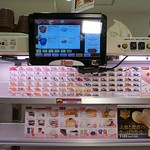

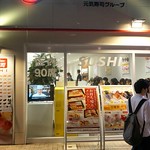
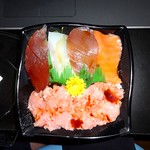
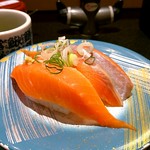





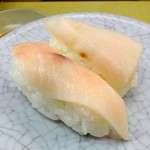
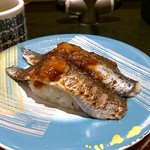


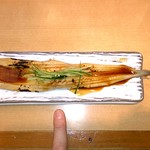


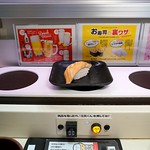
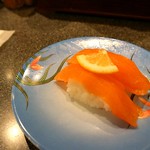
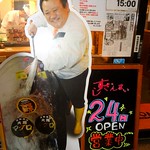








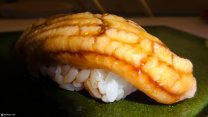









 My name is
My name is